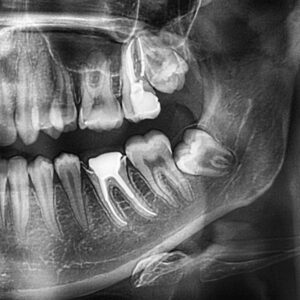 Wisdom teeth, or third molars, generally appear during the late teenage years or early twenties. While some people may not encounter any issues with their third molars, others may encounter various problems that require attention. In this article, we’ll explore common signs indicating that your third molars need professional evaluation and discuss when it’s crucial to seek dental care.
Wisdom teeth, or third molars, generally appear during the late teenage years or early twenties. While some people may not encounter any issues with their third molars, others may encounter various problems that require attention. In this article, we’ll explore common signs indicating that your third molars need professional evaluation and discuss when it’s crucial to seek dental care.
Introduction
Wisdom teeth are the final molars to appear in the back of the mouth. If they grow properly aligned and healthy, they can be valuable assets. However, due to insufficient space in the jaw or misalignment, wisdom teeth may become impacted or cause complications.
Common Signs and Symptoms
Pain
One of the most prevalent indicators that your wisdom teeth need attention is pain. This discomfort may manifest as a muted ache or intense pain in the back of the mouth near the molars. The pain can worsen when chewing or biting down.
Swelling
Swelling around the gums in the back of the mouth is another common symptom of problematic wisdom teeth. Swelling may occur due to infection or inflammation caused by impaction or partial eruption.
Difficulty Chewing
Difficulty chewing or biting down properly can indicate issues with your wisdom teeth. You may experience discomfort or find it challenging to open your mouth fully due to the presence of impacted or misaligned wisdom teeth.
When to Seek Professional Evaluation
If you experience any of the symptoms above or notice other unusual changes in your oral health, promptly seek a professional dental evaluation. Dental 32 Fresh Smiles can examine your wisdom teeth using X-rays and clinical assessments to determine the underlying cause of the symptoms.
Causes of Wisdom Teeth Problems
Wisdom teeth problems often arise due to overcrowding in the mouth, improper alignment, or impacted teeth, which are unable to emerge fully through the gums.
Complications Associated with Untreated Wisdom Teeth
Ignoring symptoms of problematic wisdom teeth can lead to various complications, including:
- Gum disease
- Tooth decay
- Damage to adjacent teeth
- Formation of cysts or tumors
Treatment Options
Extraction
In cases where wisdom teeth are causing significant issues or pose a risk to oral health, extraction may be recommended. Oral surgeons or dentists can safely perform dental extractions to remove impacted or problematic wisdom teeth.
Pain Management
Dentists may prescribe pain relievers or recommend over-the-counter medications to alleviate discomfort associated with problematic wisdom teeth. Using ice packs on the impacted area can also help reduce swelling and pain.
Tips for Managing Discomfort
- Preserve good oral hygiene by brushing and flossing.
- Rinse mouth with warm saltwater to relieve aching gums.
- Avoid hard or crunchy foods that may exacerbate discomfort.
Prevention Measures
While it’s not always possible to prevent issues, practicing good oral hygiene and attending regular dental check-ups can help detect problems early and prevent complications.
Importance of Regular Dental Check-ups
Routine dental check-ups enable dentists to monitor the development of wisdom teeth and address any emerging issues promptly. Early intervention can stop more expansive dental concerns in the future.
Removal Process
The removal process typically involves:
- Evaluation and X-rays
- Anesthesia administration
- Tooth extraction
- Post-operative care instructions
Recovery Period
Recovery from extraction can vary depending on individual factors and the complexity of the procedure. To promote healing and minimize complications, it’s essential to follow post-operative maintenance instructions supplied by your dentist.
FAQs
Q: Is the removal procedures painful?
A: While discomfort and swelling are common after extraction, dentists use anesthesia to ensure patients are comfortable during the procedure.
Q: Can impacted wisdom teeth cause other dental problems?
A: Yes, they can lead to various complications, including infection, tooth decay, and damage to adjacent teeth.
Q: How long does it take to recover from extraction?
A: The recovery period varies for each individual but typically lasts about a week. Following post-operative care instructions can expedite the healing process.
Conclusion
Recognizing the signs indicating that your third molars need attention is crucial for maintaining oral health. If you experience pain, swelling, or difficulty chewing, don’t hesitate to seek professional dental evaluation. Early intervention can prevent complications and ensure optimal oral health.
Non-covered benefits may not be deemed medically necessary by insurance providers but can still be essential for maintaining dental health.
If a procedure isn’t covered by insurance, it’s essential to discuss alternative payment options with your dentist and budget for the expense accordingly.
Regular dental check-ups are critical for preventive care, regardless of insurance coverage. Skipping them can lead to more significant dental issues in the future
Budgeting for dental expenses ensures that you can cover the costs of non-covered benefits and access necessary treatments when needed.
